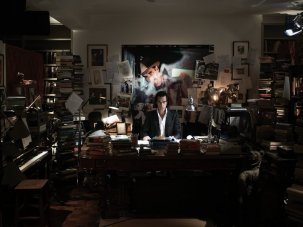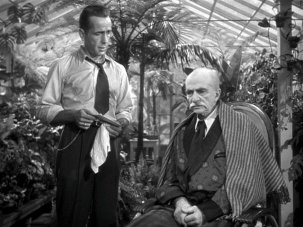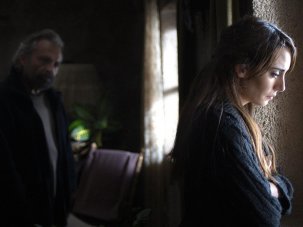
David Fincher has in recent years established himself as the man to shepherd blockbuster adaptations with consummate polish and meticulous style – whether it’s putting his unmistakeable stamp on The Girl with the Dragon Tattoo, or steering engrossing re-workings of British television series such as House of Cards or his upcoming take on Channel 4’s Utopia. His new feature is a perfect case in point, with Fincher bringing novelist Gillian Flynn’s bestselling Gone Girl to the screen. An engrossing exploration of the dark secrets at the heart of a dysfunctional marriage, starring Ben Affleck as a husband suspected of foul play after the disappearance of his wife (Rosamund Pike), it’s perfect material for Fincher. The director talks to Nick James about the narcissism of modern relationships and whether he’s made a Fatal Attraction for our times.
Posted to subscribers and available digitally 5 September
→
→ Sign up / log in
On UK newsstands 9 September
Another artist drawn to the gloomier sides of human nature is Australian musician and songwriter Nick Cave, the subject of 20,000 Days on Earth, a stunningly inventive new docufiction by British artist filmmakers Iain Forsyth and Jane Pollard that merges live performance, archive footage, dream sequences and even a dose of good old-fashioned Lacanian psychoanalysis. They tell Thirza Wakefield about working with Cave, “the hardest working, most progressive, professional, down-to-earth, yet crazy-big thinker that we’ve ever met”.
Cave has long been cast in the role of doom merchant, and another figure both defined and confined by his persona was the German actor Peter Lorre, whose first big on-screen role, as the grotesque pop-eyed child-killer in Fritz Lang’s M, instantly marked him out as one of the all-time greats, but also haunted him for the rest of his career, seeing him typecast in a series of films playing melancholy psychopaths and sadists. Philip Kemp explores the career of one of cinema’s greatest actors.
If Lorre couldn’t escape the image cast by his breakthrough, then neither, argues David Thomson, could the late Lauren Bacall transcend the legend she established in her two most famous films with husband Humphrey Bogart, The Big Sleep and To Have and to Have Not. Was her career thereafter one of more limited achievement?
The spectres of Hollywood’s past also hang over David Cronenberg’s latest vicious satire, Maps to the Stars, in which Julianne Moore gives a blistering performance as a self-obsessed actress living in the shadow of her late movie-star mother. Cronenberg talks to Nick James about Tinseltown and ghosts.
Lastly for this month’s features, Michael Brooke profiles the work of one of cinema’s great margin walkers, the Polish director Pawel Pawlikowski. Pawikowski’s work has straddled documentary and fiction, and his latest feature, Ida, an exploration of the legacy of the Nazi occupation of Poland, is perhaps his finest work to date, and affirms his obsession with exiles and outsiders.
Our Wide Angle section meanwhile, includes a report form this year’s Locarno film festival as well as a profile of the long-overlooked Brazilian filmmaker Ozualdo Ribeiro Candeias and more.
Elsewhere, we review all of the latest UK theatrical releases, including Frederick Wiseman’s At Berkeley, Matthew Warchus’s Pride, Ben Rivers and Ben Russell’s A Spell to Ward Off the Darkness and James Brown-biopic Get on Up.
Our DVD and Blu-ray section considers an exhaustive new boxset of Werner Herzog’s films alongside revived British TV science fiction series The Changes and much more. Our Books reviews include a new study of the work of Fred Zinnemmann and a monolith-like celebration of Kubrick’s 2001.
All this and much more besides…
-
Sight & Sound is now available in digital editions for Apple iOS, Android and Kindle Fire as well as computer desktops. Scroll this gallery to browse this issue’s sections.
-
RUSHES: Highlights of the LFF, five key films by Francesco Rosi, Hannah McGill on disembodied hands in the movies, Ehsan Khoshbakht talks to Mohammad Rasoulof and Mark Cousins on the community ethos behind Michael Moore's Traverse City Film Festival
-
THE INDUSTRY: Pride, music event cinema at the box office and Film4 and the success of The Inbetweeners films
-
OBITUARIES: Robert Drew and Harun Farocki
-
David Fincher talks to Nick James about adapting Gillian Flynn’s bestselling novel Gone Girl, the narcissism of modern relationships and the slippery art of manipulating expectations of innocence and guilt.
-
Thirza Wakefield talks to Iain Forsyth and Jane Pollard about 20,000 Days on Earth, a stunningly inventive docufiction portrait of 24 hours in the life of Australian rocker Nick Cave.
-
David Thomson on Lauren Bacall and how her status as a Hollywood legend is actually built on just two films – To Have and Have Not and The Big Sleep.
-
Throughout his career, Pawel Pawlikowski has demonstrated a particular affinity for exiles and outsiders – and his latest, Ida, a drama examining post-WWII Poland, is no exception finds Michael Brooke.
-
The grotesque pop-eyed child-killer in Fritz Lang’s M instantly marked Peter Lorre out as one of the all-time great actors. Philip Kemp explores his long career mostly playing melancholy psychopaths and sadists.
-
Nick James talks to David Cronenberg about his vicious Hollywood satire Maps to the Stars
-
WIDE ANGLE: Ozualdo Ribeiro Candeias, the sound of jazz, a tale of piracy from the silent film years, a report from the Locarno Film Festival
-
REVIEWS: Pride, At Berkley, Get On Up + 41 more new releases
-
HOME CINEMA: The Werner Herzog Collection, The Essential Jacques Demy, forgotten 1970s children's series The Changes plus 13 more releases as well as Alan Clarke's Road in our Lost & Found column
-
BOOKS: An appraisal of Fred Zinnemann, a study of star presence on the big screen and a new tome on Kubrick's 2001: A Space Odyssey
-
ENDINGS: Jasper Sharp on The Ballad of Narayama
Features
COVER FEATURE: Love is the devil
David Fincher’s big-screen version of Gillian Flynn’s bestselling novel Gone Girl explores the dark secrets at the heart of a dysfunctional marriage. Here the director discusses the narcissism of modern relationships and the slippery art of manipulating expectations of innocence and guilt. By Nick James.
Life in a day
Iain Forsyth and Jane Pollard’s 20,000 Days on Earth presents a stunningly inventive docufiction portrait of 24 hours in the life of Australian rocker Nick Cave, merging archive footage, live performance, dream sequences and even a dose of good old-fashioned Lacanian psychoanalysis. By Thirza Wakefield.
Slim pickings
For all of the generous obituaries that accompanied Lauren Bacall’s recent death, her status as a Hollywood legend is actually built on just two films – To Have and Have Not and The Big Sleep. In everything else, she was at best respectable, at worst lost. By David Thomson.
The outsider
Throughout his career, Pawel Pawlikowski has shown an unwillingness to be constrained by commercial or editorial pressures, and demonstrated a particular affinity for exiles and outsiders – and his latest, Ida, a drama examining post-WWII Poland, is no exception. By Michael Brooke.
Making faces
Peter Lorre’s first big on-screen role, as the grotesque pop-eyed child-killer in Fritz Lang’s M, instantly marked him out as one of the all-time greats, but it also haunted him for the rest of his career, seeing him typecast in a series of films playing melancholy psychopaths and sadists. By Philip Kemp.
Ghost world
David Cronenberg’s vicious Hollywood satire Maps to the Stars is powered by a blistering performance by Julianne Moore as a self-obsessed actress living in the shadow of her late movie star mother. Here the director explains why Tinseltown finds it so hard to escape the spectres of its past. By Nick James.
Regulars
Editorial
Gimme shelter
Rushes
In the frame: London calling
With the BFI London Film Festival looming, we offer a few tips to help guide you through the maze of great films on offer. By Isabel Stevens.
Object lesson: A show of hands
Dead hands on screen often appear to be more than mere flesh and bone, retaining sensual vestiges of their erstwhile owners. By Hannah McGill.
The five key…: Francesco Rosi films
On the eve of the rerelease of Salvatore Giuliano, we choose the major works from a towering figure in post-war Italian cinema. By Pasquale Iannone.
Preview: Uncontrolled dissent
In the face of arrest, travel bans and censorship, the Iranian director Mohammad Rasoulof remains determined to provoke. By Ehsan Khoshbakht.
Dispatches: Festival express
The Traverse City Film Festival has not only been a boon to the local economy, it’s shown the enduring public hunger that exists for cinema. By Mark Cousins.
The industry
Development tale: Pride
The tale of an unlikely partnership between striking miners and gay activists only came to fruition after years chipping away at the coalface. By Charles Gant.
The numbers: Music event cinema
Brewster: Laughing to the bank
What does the success of The Inbetweeners films mean for the more commercially challenging work for which Film4 is known? By Ben Roberts.
Obituaries
Robert Drew: 1924-2014
Pioneer of Direct Cinema and close observer of the realities of American political power in the era of JFK and Civil Right. By Adam Nayman.
Harun Farocki: 1944-2014
German Marxist filmmaker who criticised the constraints Western society places on our bodies and our imaginations. By Nicole Brenez.
Wide angle
Profile: Marginal revolutionary
Ozualdo Ribeiro Candeias spent nearly 40 years portraying Brazil’s forgotten poor – and has been all but forgotten himself. By Aaron Cutler
Soundings: Blue is the coolest colour
The movies have always loved the sound of jazz. What they’re not so keen on is what the music means, and the pain that lies behind it. By Daniel Barrow.
Primal screen: The world of silent cinema
A tale of early piracy that is a good deal more Blackburn than Blackbeard. By Bryony Dixon.
Festival: Locarno
Even in a programme dominated by experimental work, Locarno found room for a host of eccentric, humorous and chatty tales. By Isabel Stevens.
Reviews
Films of the month
At Berkeley
Pride
A Spell to Ward Off the Darkness
plus reviews of
All Cheerleaders Die
Alleluia
Attila Marcel
Ballet Boys
The Expendables 3
Get On Up
Grand Piano
Guardians of the Galaxy
The Guest
The Guvnors
Hector and the Search for Happiness
Hercules
The Hundred-foot Journey
Ida
The Inbetweeners 2
In Order of Disappearance
Into the Storm
I Origins
The Last Impresario
Let’s Be Cops
Life of Crime
Lucy
Magic in the Moonlight
Maps to the Stars
Million Dollar Arm
A Most Wanted Man
Night Will Fall
Palo Alto
Planes Fire & Rescue
Salomé
Sex Tape
Step Up All In
They Came Together
Think Like a Man Too
20,000 Days on Earth
A Walk Among the Tombstones
Watermark
What We Did on Our Holiday
Wilde Salomé
Wish I Was Here
You and the Night
DVD features
Wanderlust and wonder: The Werner Herzog Collection
Even when not filming in perilous conditions or far-off locations, Werner Herzog is interested in the extremes of the human experience. By Michael Brooke.
Revivals
Demy monde: The Essential Jacques Demy
Jacques Demy was a great pop artist – but his reputation for frothy exuberance ignores the often bitter realities of his subject matter. By Nick Pinkerton.
The world gone mad: The Changes
A forgotten 70s children’s series about survival in an unravelling society reveals much about the state of the nation at the time. By Rob Young.
plus reviews of
Films starring Charles Bronson
Caught
Favorites of the Moon
Hearts and Minds
House of Bamboo
Madame Dubarry
The North Star
Armored Attack!
The Roots of Heaven
Stranger on the Prowl
Films by François Truffaut
We’re in the Movies: Palace of Silents & Itinerant Filmmaking
Television reviews of
The Boy from Space
Z Cars: Collection Two
Lost & Found
Road
Broadcast in 1987, the television drama Road was Alan Clarke’s devastating response to Margaret Thatcher’s ‘war on the North’. By Nick Wrigley
Books
Fred Zinnemann and the Cinema of Resistance
Watching Them Be: Star Presence on the Screen from Garbo to Balthazar
The Making of Stanley Kubrick’s 2001: A Space Odyssey
Letters
Man with a Movie Camera and The Ukraine
The unsung Alan Badel
Directors vs. Reviewers
Dont Look Back and the S&S Documentary Poll
Edgar G. Ulmer
Maria Schneider and Last Tango in Paris
Billy the Kid: a right-handed gun
Endings
The Ballad of Narayama
Death is not the end in Imamura Shôhei’s bleak tale of a village community’s struggle for survival, just another stage in the cycle of life. By Jasper Sharp.
Further reading
-
The Digital Edition and Archive quick link
Log in here to your digital edition and archive subscription, take a look at the packages on offer and buy a subscription.













